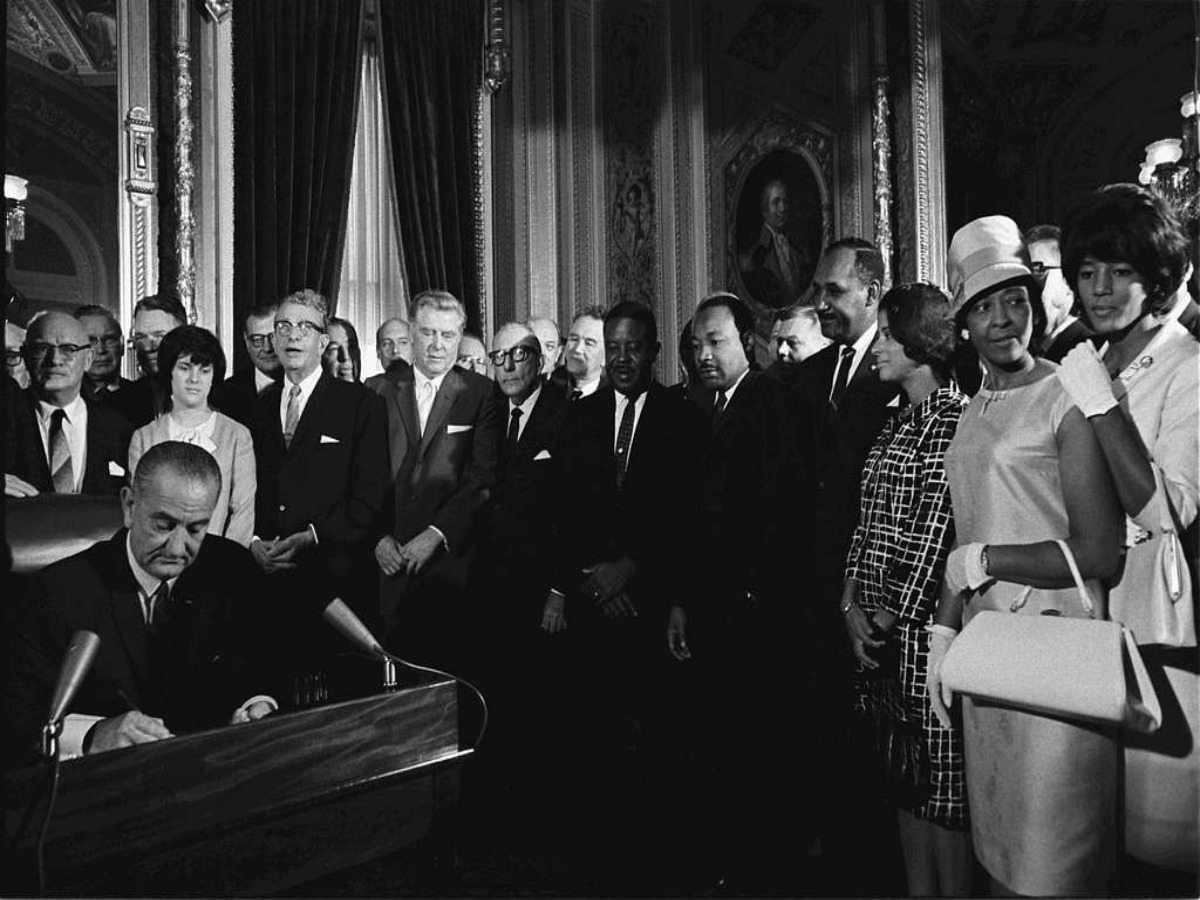Six decades after President Lyndon B. Johnson signed the Voting Rights Act into law with Martin Luther King Jr. by his side, the legislation that once marked a pivotal moment in American democracy now stands on uncertain ground.
The 1965 law was designed to secure voting rights and guard against suppression, particularly against Black Americans. For many, it symbolized a new beginning for U.S. democracy.
But over the past decade, that foundation has steadily weakened.
In 2013, the U.S. Supreme Court struck down a core provision requiring certain states with histories of discrimination to obtain federal clearance before altering election laws. Within hours, states previously bound by the preclearance rule began rolling out more restrictive voting measures.
READ ALSO: Judge blocks Trump administration’s bid to divert $4 billion in climate resilience funds
The erosion accelerated after the 2020 election, fueled by President Donald Trump’s baseless allegations of widespread voter fraud. And now, the Supreme Court is set to review cases that could further dismantle the landmark legislation, even after it upheld a crucial section in 2023.
Watch a recent episode of The BreakDown podcast below and subscribe to our channel PanaGenius TV for latest episodes.
“We’re at a critical juncture right now,” said Demetria McCain, policy director at the NAACP Legal Defense Fund. “And, let’s be clear, our democracy is only about to turn 60 when the Voting Rights Act anniversary gets here. I say that because there are so many attacks on voting rights, particularly as it relates to Black communities and communities of color.”
One of the most visible signs of the law’s legacy, and its current vulnerability, is unfolding in North Dakota, where the Turtle Mountain Band of Chippewa Indians and the Spirit Lake Tribe sued the state over legislative maps they said denied Native communities a meaningful voice.
U.S. District Court Chief Judge Peter Welte agreed with the tribes and ordered a new map. Under the redrawn districts, Collette Brown of the Spirit Lake Tribe was elected to the state legislature.
“It felt surreal. I felt accomplished, I felt recognized,” said Brown, who also serves as the tribe’s Gaming Commission executive director. “I felt, OK, it’s time for us to really start making change and really start educating from within so that we’re not silenced.”
Brown, a Democrat, helped sponsor several bills addressing Indigenous issues, including measures supporting the return of Native remains and improving response systems for missing persons.
But now the district’s future, and the broader ability of individuals to defend voting rights in court, rests with the Supreme Court.
The 8th U.S. Circuit Court of Appeals reversed Welte’s ruling in a 2-1 decision, concluding that private groups like the NAACP Legal Defense Fund and the ACLU lack legal standing to challenge voting rights violations. The decision mirrored a similar ruling from another Arkansas case, and a 3rd Circuit panel recently sided with the idea that only the U.S. attorney general, not private citizens, can bring such cases.
The Supreme Court has temporarily halted the ruling while it considers whether to take up the North Dakota case. But legal experts warn that if the high court affirms the lower ruling, it would dismantle a key mechanism used to enforce Section 2 of the law.
According to the University of Michigan Law School’s Voting Rights Initiative, nearly 87% of Section 2 cases since 1982 have been brought by private individuals or advocacy groups.
Sophia Lin Lakin, director of the ACLU’s Voting Rights Project, said the stakes are especially high given how the Justice Department has shifted focus under the Trump administration.
“The government’s voting rights unit has been dismantled and given new priorities,” she said, adding that the changes have turned enforcement “against the very people it was created to protect.”
While the Justice Department declined to comment on its priorities or upcoming voting rights litigation, advocates say the department’s absence only heightens the importance of private legal challenges.
Two years ago, there was a brief victory: the Supreme Court preserved Section 2 in an Alabama case, ordering a new district favorable to Black voters. But now, a similar case from Louisiana could unravel that gain.
In March, the justices heard arguments in the Louisiana case but didn’t issue a ruling. On Friday, they requested additional briefs exploring whether the intentional creation of a second majority-Black district would violate the Constitution’s Fourteenth or Fifteenth Amendments.
Robert Weiner, of the Lawyers’ Committee for Civil Rights Under Law, said the court’s indecision could mean the outcome is still up in the air.
“They wouldn’t need re-argument if the sides had already been chosen,” he said.
Meanwhile, the Justice Department, now under Attorney General Pam Bondi, has redirected attention away from voting access to alleged voter fraud, a concern amplified by right-wing activists despite lack of evidence.
The department has abandoned or withdrawn from several election-related cases, and it has been requesting detailed voter registration data and issuing notices of potential violations in at least 19 states.
At the federal level, efforts to bolster voting protections have stalled. The John Lewis Voting Rights Advancement Act has been reintroduced, but it failed to pass even when Democrats controlled both chambers of Congress in 2022.
Trump has also continued efforts to reshape election laws. Earlier this year, he signed an executive order imposing proof-of-citizenship requirements for federal voter registration, though most of it remains blocked in court. A Republican-led bill in the House mirrors that push.
In the midst of gerrymandering and voter access battles, a growing patchwork of state laws now dictates the ease or difficulty of voting.
“The last five to 10 years,” said Sean Morales-Doyle of NYU’s Brennan Center for Justice in an AP report, “the experiences of voters increasingly depend on where they live.”
READ ALSO: Whites-only town in Arkansas draws outrage over racist ‘Return to the Land’ movement










